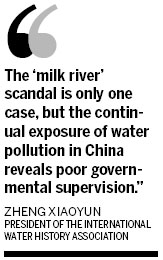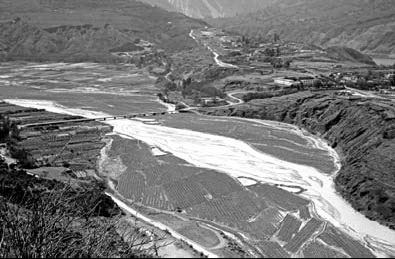Absence of oversight resulted in pollution
Updated: 2013-04-11 07:58
By Zheng Xin in Beijing and Li Yingqing in Kunming (China Daily)
|
||||||||
|
Children on the bank of a polluted river in Dongchuan district in Kunming, Yunnan province, in March. Guo Tieliu / for China Daily |
|
A bird's-eye view of the polluted Xiaojiang River in March. Guo Tieliu / for China Daily |

Expert urges authorities to boost their monitoring of enterprises
Recent water pollution scandals reflect poor supervision by local governments, an expert said in response to a case of river pollution in Yunnan province.
Zheng Xiaoyun, assistant director of the Yunnan Academy of Social Sciences and president of the International Water History Association, spoke of the "milk river" case, a reference to the Xiaojiang River in the Dongchuan district of Kunming, the Yunnan provincial capital.
The river looks as if it has been tainted with milk due to the discharge of tailwater by mining companies.
"The 'milk river' scandal is only one case, but the continual exposure of water pollution in China reveals poor governmental supervision," Zheng said.
Wang Jieyun, director of the district's environmental protection bureau, told China Daily on Wednesday that the direct discharge had contributed to water pollution in the river, after earlier denying that no wastewater was being discharged into the river.
The Dongchuan environmental protection bureau said five enterprises discharged waste into the river through concealed drainage tubes.
Lu Rongxiang, a villager in the district who has been growing watermelons for more than 20 years, said the river water started becoming muddy and turbid about 10 years ago.
"We have to filter the water before using it to irrigate the watermelon field," he said. "And if your feet are splashed with the river water, they get itchy."
The district environmental protection bureau said it has dismantled the hidden discharge pipes and fined the companies.
The district is conducting all-weather supervision of the enterprises involved in the case, Wang said.
There are 45 mineral processing enterprises scattered along the river but only 11 are operating, with 28 shut down and six suspended from business, he said.
The bureau also encourages residents to report any illegal pollution discharges by contacting the government's hotline.
Zheng said water quality is closely related to public health, and the government should attach significant importance to the issue and further strengthen supervision of local water pollution.
According to the China Water Pollution Map issued by the Institute of Public and Environmental Affairs, an environmental NGO, the upper Xiaojiang River is scattered with several heavy metal pollution sources.
The map provides information on the country's water quality, discharge of pollutants, pollution sources, businesses that exceed discharge quotas, and sewage treatment plants from about 300 prefecture-level cities nationwide.
Ma Jun, director of the Institute of Public and Environmental Affairs, said water quality is worsening in most Chinese rivers due to over-exploitation and poor supervision.
Wang said that in addition to discharges from enterprises, the harsh natural environment, poor forest cover and occasional debris in the water also contribute to declining water quality in the region.
Excessive levels of the organic compound aniline were found recently in well water in Cangxian county, Hebei province, turning the water red. The county's former head of the environmental protection bureau denied any risk at first, saying "the color does not mean the water is polluted as water, after boiling with red beans, turns the same color."
His response triggered public outrage, and he was dismissed soon afterward.
A team has been set up to study the cause of the pollution but no results have been released to date.
Guo Anfei in Kunming contributed to this story.
Contact the writers at zhengxin@chinadaily.com.cn and liyingqing@chinadaily.com.cn
(China Daily 04/11/2013 page4)

 In Photos: 7.0-magnitude quake hits Sichuan
In Photos: 7.0-magnitude quake hits Sichuan
 Li Na on Time cover, makes influential 100 list
Li Na on Time cover, makes influential 100 list
 FBI releases photos of 2 Boston bombings suspects
FBI releases photos of 2 Boston bombings suspects
 World's wackiest hairstyles
World's wackiest hairstyles
 Sandstorms strike Northwest China
Sandstorms strike Northwest China
 Never-seen photos of Madonna on display
Never-seen photos of Madonna on display
 H7N9 outbreak linked to waterfowl migration
H7N9 outbreak linked to waterfowl migration
 Dozens feared dead in Texas plant blast
Dozens feared dead in Texas plant blast
Most Viewed
Editor's Picks

|

|

|

|

|

|
Today's Top News
Live report: 7.0-magnitude quake hits Sichuan, heavy casualties feared
Boston suspect cornered on boat
Cross-talk artist helps to spread the word
'Green' awareness levels drop in Beijing
Palace Museum spruces up
First couple on Time's list of most influential
H7N9 flu transmission studied
Trading channels 'need to broaden'
US Weekly

|

|









